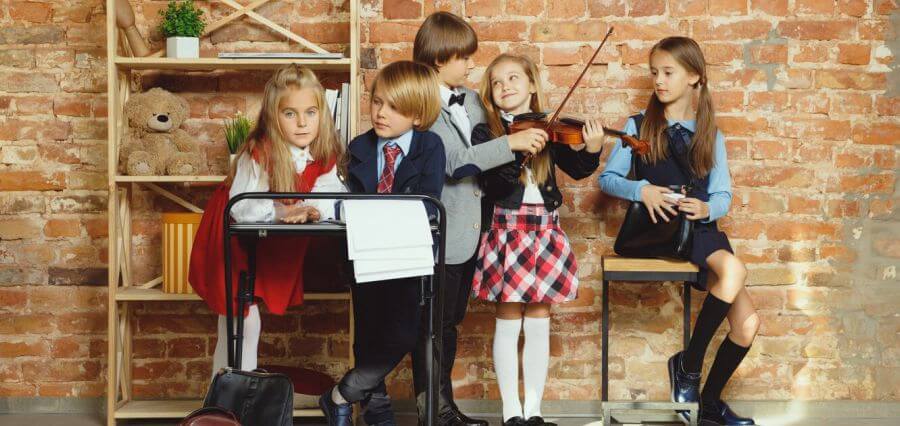Music is not just an art form, but an excellent developmental tool for children. It influences cognitive growth, emotional well-being, and social skills. What parents don’t often know is that musical activities can be tailored to benefit children’s mental and emotional development at each stage of life, and this blog will explore positive musical experiences for infants, toddlers, elementary aged kids, and teens.
Musical Exposure for Infants
During the infancy stage, the primary goal of musical activities is to establish a sense of security and to stimulate early auditory development. Gentle activities such as singing lullabies or softly playing classical music will soothe your child of course, but they can also stimulate neural connections in the developing brain. Research suggests that soft, rhythmic songs enhance an infant’s ability to process sounds and language—this sets them up for success in every aspect of life later on. The repetitive nature of lullabies and soft tunes also helps with memory development, and it provides a calming effect that supports emotional regulation.
To apply this principle in your home, consider playing soft melodic music in your child’s room rather than a sound machine when possible, hum and sing to your child, and ask your infant daycare if they sing to the children before you enroll.
Music For the Toddler Years
Children can start to actually participate in music in years 1 and 2, and by the time they reach the “threenager” stage, they will probably be singing and dancing consistently. Engaging toddlers in sing-alongs that include body movements, such as “The Wheels on the Bus” or “Head, Shoulders, Knees, and Toes,” helps them to develop coordination and understand their physical space. At this stage, introducing simple instruments like tambourines, small drums, or xylophones encourages exploration and aids in developing fine motor skills. Consider a class like Music Together, Kindermusik, or something similar. The hands-on experience with instruments boosts both cognitive and physical skills, including pattern recognition and eye-hand coordination. Studies show that musical exposure and participation can accelerate toddlers’ motor and rhythmic coordination, potentially advancing skills like timing and sequence understanding. Also, as we all know, music has an incredible impact on your toddler’s mood, and by the time your child is three, he or she can genuinely enjoy music.
Musical Activities For Elementary-Aged Kids
During the elementary years, children are positioned to benefit from more structured musical education such as formal lessons in playing instruments, singing in choirs, or participating in school musicals. Learning to play instruments like the piano, violin, or guitar not only enhances children’s fine motor skills but also strengthens self-discipline. Furthermore, music education during these years is linked with improved academic performance. Notably, a study from the University of California suggests that music training is associated with enhanced mathematical skills and greater neural processing, underscoring the academic benefits of musical engagement. Additionally, group musical activities foster teamwork and empathy, as children learn to work collaboratively and appreciate the contributions of their peers.
Mastering a musical instrument (or at least gaining proficiency in it) also sets the stage for strong self esteem in the challenging teenage years – we’ll continue with that below.
How Music Can Benefit Teenagers
In teenage years, musical activities can serve as a critical outlet for self-expression and identity formation. Participation in bands or orchestras provides teens with a sense of belonging and a platform to express their individuality. Advanced studies in music theory or audio production can also appeal to this age group, and it will help them develop abstract thinking skills.
For many teens, technology-based music creation offers an engaging way to experiment with music, enabling them to produce and share their work digitally. The social and emotional benefits of these activities are significant, providing teens with ways to manage stress, express feelings, and connect with others on a meaningful level.
Of note, it pays off to support your teenager pursue a genre of music that they enjoy. Encourage your teenager to learn to sing pop music, or encourage their amateur music production experimentation. Even in the teenage years, they are still figuring out what they love about music and what to pursue.
In Conclusion: There’s a Reason That Music Therapy is So Popular
If you need further encouragement that music is a valuable activity for kids, consider the amount of resources devoted to music therapy. States have entire boards dedicated to this discipline, and rigorous studies have shown how music therapy improves the behavior of severely autistic children, helps with recall in older adults suffering from dementia, and can help with numerous other issues. It only stands to reason that your child, whatever their age, would benefit from musical activities.









